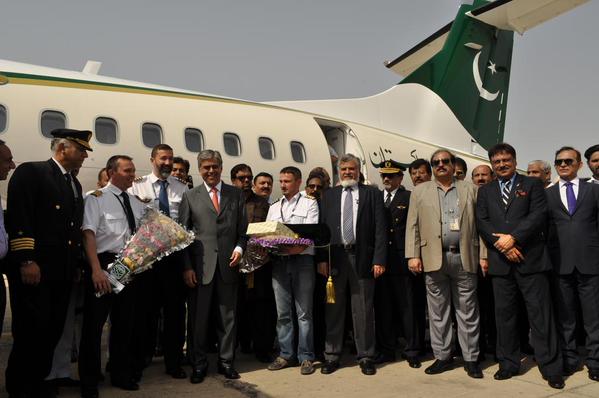
PIA's staff posing for a picture in front of a newly acquired ATR-72. A small plane that carries 72 passengers, which has been assigned to most routes in Balochistan. Image tweeted by @Official_PIA on April 10, 2015.
This is an edited version of a post originally written by Adnan Aamir for The Balochistan Point and is published according to a content sharing agreement.
Like thousands of other Pakistanis, Sajid Baloch works as a construction worker in Dubai. Every six months he visits his family in Quetta, Balochistan province's capital and largest city.
Sajid used to fly directly to his hometown from Dubai on the national carrier Pakistan International Airlines (PIA). Life was easy for him back then.
When he visited Pakistan in April this year, Sajid had to fly an extra hour and a half covering the 680 kilometers between Karachi, Pakistan's largest city, and Quetta. PIA had closed down all of its Quetta-Dubai flights.
“I work tirelessly to meet the ends of my extended family. I cannot afford extra expenses, which I have to bear now when I travel to Karachi to board a Dubai-bound flight,” lamented Sajid in a desperate tone.
The extra travel can cost him between $250-550.
Sajid Baloch is one of many people in Balochistan who say they suffer due to the incompetence, discrimination and apathy of PIA administration towards Pakistan's vast southwestern province. Balochistan makes up about 44% of Pakistan's land mass, but is home to less than 5% of the country's population. The province is Pakistan's least developed and poorest. Many turn to the Middle East for employment.
On the other side, with 17,000 employees and only 36 planes, some say PIA is one of the world's worst managed airlines. It ran losses as high as 207 billion rupees (US$2.03 billion) in 2014. Despite this PIA services 70 percent of the domestic market in Pakistan, overshadowing three smaller commercial airlines.
The Balochistan Point dug deeper into PIA's operations in Balochistan, one of Pakistan's four provinces. We found six troubling issues with the national airline.
The PIA administration based in Karachi and Quetta was not available for comment when we contacted them. Many of the issues below were corroborated by sources within PIA that want to stay anonymous. If you have more information or a correction you'd like to share, please add it in the comments section.
1. Smaller planes
PIA is the only airline that services six cities in Balochistan. Besides the Quetta route, PIA replaced all of its planes in Balochistan with small ATR-72 aircrafts. Previously, PIA operated large aircrafts B-737, A-310, A-320 and B-777, which could carry hundreds of passengers. ATR-72 planes can only carry 72 passengers.
Interior of PIA's latest acquisition. #ATR72. #KarachiAirport. Photo by Zain Maqsood. #PaxEx #Cabin @RunwayGirl pic.twitter.com/GzfYXVYbZc
— Mo Firaas (@raisinganchor) April 12, 2015
Over the years, PIA has also cut down the number of flights that serviced the province. Some airports only receive two flights a week.
As a result, not as many people from Balochistan can avail aviation services. Private airlines operate only a few flights a week from Quetta. No private airline services other cities.
Another issue with ATR-72 planes is that it has to reduce the weight it carries when temperature rise to 35C (95F). So on a warm day, passengers have to fly without their luggage. They have to wait several hours as their luggage is transported by road.
2. International flights
The national carrier provides no international flights from Balochistan's largest city Quetta. There is not even a direct pilgrimage flight from Balochistan to Saudi Arabia, the most popular traveling destination in the country.
As of now, there are five international flights that PIA operates from two small cities that are only 76 miles a part in massive Balochistan, which covers 134,050 square miles. They use those small 72-seat airplanes.
Once a week, a small PIA aircraft flies back and forth between Gwadar, Pakistan's over-invested and under-developed port city, to Muscat, Oman. Close by in Turbat, every week, another small aircraft flies to Muscat, and three small planes fly to Sharjah in the UAE.
People from Quetta, Zhob, Noshki and Chaman and other cities in Balochistan travel in high numbers to the Middle East for business and employment. They are forced to travel via Karachi, Pakistan's biggest city or the two smaller cities in Balochistan.
3. Limited services
Besides the capital Quetta, PIA flies to these smaller cities: Dalbandin, Panjgur, Zhob, Gwadar, Quetta and Turbat.
A source within PIA told The Balochistan Point on condition of anonymity that, “PIA can shut down the flights from smaller stations of Balochistan just like it close down international flights to Dubai and replaced larger planes with ATR-72.” PIA source further added, “Shutting down smaller stations would be a catastrophe for people of Balochistan and people would strongly protest.”
The source estimated that of PIA shuts down these routes, every day about 1,000 passengers could be affected.
4. Medical emergencies
Health services in Balochistan are abysmal. Critical patients are often flown to Karachi, which has better medical facilities for treatment. Aviation sources told The Balochistan Point that ATR-72 doesn’t have the facility of carrying stretcher patients. Other airlines already don’t provide this facility. So, effectively, the PIA administration has also cut down medical facilities to the people of Balochistan.
Before the change, Maqbool Zaheer, a 48 year-old trader told The Balochistan Point how flying his ill mother to Karachi saved her life. “She was very ill and doctors in Quetta told me to take her to Karachi for further treatment. I booked a stretcher for her on a PIA flight and managed to take her to a hospital in Karachi just on time,” said Mr. Maqbool. “Depriving us from the facility of stretchers in planes is equivalent to homicide,” added Maqbool.
5. Cargo
Balochistan is known for its dry and fresh fruit. Traders in Balochistan used PIA flights to send their fruits to countries around the world. With the prevalence of ATR-72, most cargo needs to be transported to Karachi by road and then booked from Karachi's airport as cargo. This increases transportation costs and the likelihood of perishable fruit going bad.
6. Accusations of employee discrimination
Some employees of PIA in Balochistan also claim they face discrimination at the hands of PIA's administration. Out of a total staff of 17,000, about 400 employees are from the province.
PIA has over 30 international stations where employees of PIA are posted for two-three years. These postings are considered to be life-changing and lucrative. According to anonymous sources at PIA, at the moment, there is not a single PIA employee from Balochistan posted in any international station. Employees are supposed to be selected on the basis of seniority but our sources tell us this is the case for employees from Balochistan.
In addition, our sources tell us that PIA employees from Balochistan are often ignored for promotion. Like other provinces, Balochistan is allocated a “human resource” budget. Our sources claim this budget is over used in the rest of Pakistan but it’s under used in Balochistan.
Furthermore, Gilgit-Baltistan, like Balochistan, is a remote area where PIA employees prefer not to go. PIA offers extra pay to employees stationed in Gilgit-Baltistan, as an incentive to work there. There is no such incentive for PIA employees working in Balochistan.
PIA training centers are located in all major cities of Pakistan including Karachi, Lahore, Peshawar and Islamabad but not in Quetta. These training centers teach courses of aircraft engineering, aircraft technicians, flight operations and passenger handling. Students of Balochistan have to travel to other cities to study these courses. This pushes up their living expenses increase and under-privileged people can’t afford this education.
PIA is the national flag carrier and it has a duty to serve all provinces without discrimination. It’s quite clear that PIA administration is treating Balochistan as a less important part of the country, which is unacceptable to people of the province.
The people of Balochistan urge the Prime Minister of Pakistan, the Civil Aviation Authority and all the concerned authorities to investigate all these issues at PIA.








4 comments
I agree however…. PIA regulatory sends A320’s to Quetta daily. You can’t just say only ATR72’s go.
regularly*